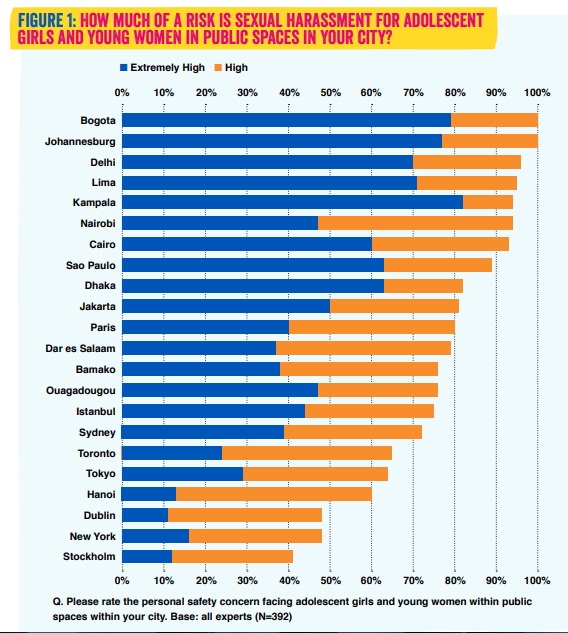In October, on International Day of the Girl, women’s and children’s charities took to the media and social media channels to highlight the ongoing challenges that girls face across the world.
Among these were Plan International, whom ComRes were pleased to have supported alongside Bloem Consulting in carrying out original research to draw attention to girls’ safety worldwide. Plan commissioned a global survey of nearly 400 experts in children’s and women’s rights and urban safety, to assess their views on the greatest risks to girls and how far they were involved in decision making in cities worldwide.
The research found that sexual harassment was the primary safety risk to girls across all cities, with four in five experts (78%) describing it as a high or extremely high risk for girls and young women. The risk of sexual assault or rape came in as the second most widespread risk, with over half (57%) of experts rating it as high or extremely high.

Some cities stood out as especially unsafe for girls; in Kampala and Johannesburg, for example, more than 50% of experts saw murder and kidnap as a high risk for girls. However, this research is also an opportunity to question here in the UK how far we still have to go to ensure public safety, and women’s safety in particular. ComRes polling for Radio 5Live in 2017 found that shocking levels of men and women had experienced sexual harassment at work or when studying: 1 in 5 men (20%) and more than half of women (53%).
There are some workplaces where safety concerns are especially prevalent. Previous ComRes research for the Suzy Lamplugh Trust in 2016 found that nearly one in five (17%) estate agents said they had conducted a property viewing where they felt unsafe, with significantly more female estate agents saying this (29% vs 5% male). Throughout the deluge of stories shared during the early days of the #MeToo movement last year, Parliament also emerged as a workplace where sexual harassment is a risk. At the end of 2017, on behalf of ITV News, ComRes surveyed those working in the Palace of Westminster, finding a large majority (82%) of parliamentary staff who said the issue of sexual harassment urgently needed to be tackled, with a quarter (24%) agreeing that it is rife in the Palace of Westminster.
As to how the problem of safety and harassment is addressed, we can return to Plan International’s report, which offers suggestions from experts that range from involving girls in policymaking, to improving the appearance and lighting of public spaces. In Parliament the issue has garnered enough attention to warrant an independent inquiry by Dame Laura Cox. The 155 page report discusses policies and procedures to address harassment and bullying in Parliament, and was published earlier this week with leaders in Parliament appearing contrite and acknowledging it “makes difficult reading”.
However, this is by no means the end of the story. It still remains to be seen how the necessary change envisioned by those like Dame Laura Cox will be implemented in practice within an established organisation. Will that be enough? And does the change organisations make within their own walls begin to make a mark on the extensive safety risks experienced by girls and women on a much vaster scale?
Originally published by ComRes.







